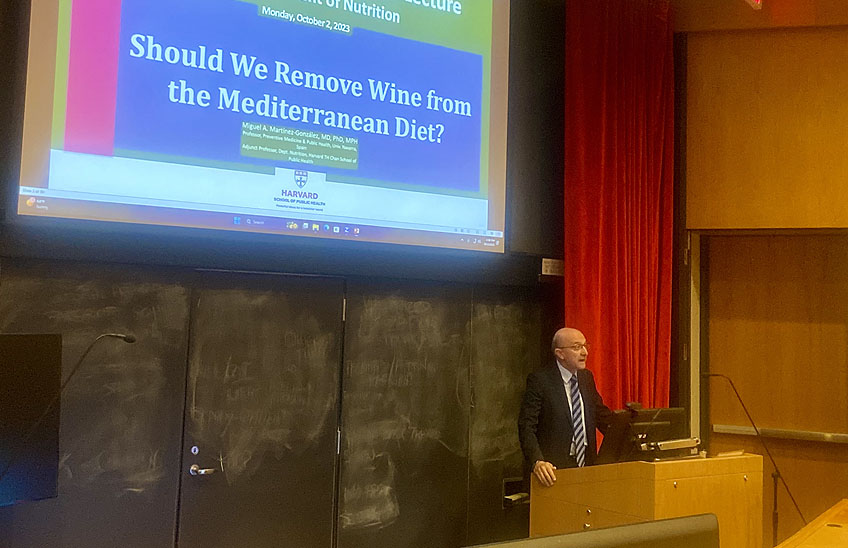The association American Heart Association endorses the 14 points of PREDIMED's Mediterranean per diem expenses
It is recommended the incorporation of brief tools of evaluation and committee nutritional in health centers through the computerized medical record.

FotoCedida/Top row, from left to right, Miguel Ángel Martínez-González, Dolores Corella and Emilio Ros; bottom row, from left to right, Jordi Salas, Montse Fitó and Ramón Struch, CIBEROBN researchers who are members of PREDIMED's committee Directivo.
25 | 05 | 2021
The association American Heart Association (AHA) has endorsed the 14 points of per diem expenses Mediterranean established by the study PREDIMED (Prevention per diem expenses Mediterranean) study, launched, together with other CIBEROBN researchers, by Professor Miguel A. Martínez-González, Full Professor of Preventive Medicine and Public Health of the School of Medicine of the University of Navarra.
This is a tool of evaluation and committee nutritional in health centers. The AHA scientific statement highlights the fundamental need for these tools in clinical care to prevent chronic diseases related to per diem expenses, especially cardiovascular diseases, which are the leading cause of death in the world. The statement advocates that "the widespread use of electronic health records opens up enormous opportunities to record dietary habits and provide evidence-based nutritional advice. There is much room for improvement and brief tools from assessment fast patron saint facilitate this advice".
On the other hand, the document provides a solid rationale for adopting rapid nutritional screening tools, both in primary and specialty care, with a valid and feasible method in the clinical setting. Among the few brief tools available that have already demonstrated high validity, the AHA highlights the great advantages of the 14-point Mediterranean adherence scale per diem expenses (MEDAS), designed in the PREDIMED study, conducted in 11 centers throughout Spain.
The six CIBEROBN researchers who make up the PREDIMED Steering Committee committee have expressed their joy and satisfaction at the enormous impact of the continued efforts of all PREDIMED members after almost two decades of work.
Professor Miguel A. Martínez-González, Full Professor of Preventive Medicine and Public Health of the University of Navarra, is part of the committee management of the PREDIMED study and was its coordinator between 2006 and 2013.
Questions about the quality of patron saint food
The 14 points of PREDIMED are made up of 14 questions that allow to make position of the quality of the whole of the food patron saint . Among the questions, the consumption of olive oil, vegetables, subject of meat, legumes or pastries, among others, are addressed.
As Montse Fitó, from IMIM (Institut Hospital del Mar d'Investigacions Mèdiques) states, "thanks to PREDIMED, the Mediterranean per diem expenses has the best guarantees of efficacy in cardiometabolic prevention and could be science's great answer to the serious consequences of obesity".
Miguel A. Martínez-González, coordinator of the network PREDIMED during 2006-2013, adds that "the group PREDIMED has already produced more than 300 scientific publications, available, like this scale, at www.predimed.es, and also several informative books of friendly reading, where it is clearly explained how each citizen can apply and benefit from these results and can personally improve in those 14 points of the Mediterranean per diem expenses ".
For his part, Ramón Estruch, from Hospital Clínic de Barcelona, director and promoter of essay PREDIMED, indicates that "it is not in vain that per diem expenses Mediterránea was chosen in 2021 as the best per diem expenses in the world -for the fourth consecutive year-, according to the U.S. News and World Report ranking. This is in addition to the excellence attributed to our scale in this important scientific statement of the AHA".
Emilio Ros, from the same hospital, explains that "this 14-point MEDAS scale was the decisive instrument for our team of nutritionists to change the overall dietary patron saint in thousands of participants and thus obtain a relative reduction of 30% in major cardiovascular events. These 14 items have already been validated in the United States, Germany, the United Kingdom, Portugal, Greece, Brazil, Italy, Macedonia, Bulgaria and other countries".
The European Heart Journal published in 2020 an important article on this 14-point per diem expenses Mediterranean scale. It was found that a series of molecules measured in blood characterized the follow-up of the Mediterranean per diem expenses and predicted a lower risk of heart attack or stroke. This is an absolute novelty in nutrition, which could also be replicated in the USA. Dolores Corella, of the University of Valencia, predicts that "the programs of study PREDIMED will be key to making progress in personalized medicine".
PREDIMED has placed the Spanish research at the forefront of the world, as it has become one of the most globally influential programs of study in nutrition. Jordi Salas, from the Universitat Rovira i Virgili concludes that "it represents the beginning of an international reference in programs of study of nutritional intervention in primary prevention".
PREDIMED points
The 14 PREDIMED items are made up of 14 questions with simple answers - "yes" or "no" - and allow you to check position on the quality of the whole of patron saint food.
1. Do you use olive oil as your main cooking fat?
Yes = 1 point
No = 0 points
2. How much olive oil do you consume in total per day (including olive oil used for frying, meals out, salads, etc.)?
4 or more tablespoons = 1 point
Less than 4 tablespoons = 0 points
3. How many servings of vegetables do you eat per day?
(1 portion is 200 g. Garnishes or side dishes are considered 1/2 portion).
2 servings or more (at least one of them in salad or raw) = 1 point
Less than 2 = 0 points
4. How many pieces of fruit do you eat per day?
3 or more per day = 1 point
Less than 3 = 0 points
5. How many servings of red meat, hamburgers, sausages or cold cuts do you consume per day?
(1 portion: 100-150 g)
Less than 1 per day = 1 point
More than 1 per day = 0 points
6. How many servings of butter, margarine or cream do you eat per day?
(1 individual serving: 12 g)
Less than 1 per day = 1 point
One or more per day = 0 points
7. How many carbonated and/or sweetened beverages (soda, cola, tonic, bitters or similar) do you consume per day?
Less than 1 per day = 1 point
More than 1 per day = 0 points
8. Do you drink wine and how much do you drink per week? *
7 or more glasses per week = 1 point
Less than 7 = 0 points
9. How many servings of legumes do you consume per week?
(1 plate or 150 g: one portion)
3 or more per week = 1 point
Less than 3 per week = 0 points
10. How many servings of seafood do you eat per week?
(1 piece or 100-150 g of fish or 200 g of shellfish: one portion)
3 or more per week = 1 point
Less than 3 per week = 0 points
11. How many times do you consume commercial confectionery (cookies, custards, candies or non-homemade cakes) per week?
Less than 2 per week = 1 point
More than 2 per week = 0 points
12. How many servings of nuts and dried fruits do you consume per week?
(30 g: one serving)
3 or more per week = 1 point
Less than 3 per week = 0 points
13. Do you prefer chicken, turkey or rabbit meat to beef, pork, hamburgers or sausages?
(1 portion: 100-150 g)
Yes = 1 point
No = 0 points
14. How many times a week do you eat vegetables, pasta, rice or other dishes seasoned with sofrito (tomato sauce simmered with olive oil, garlic, onion and/or leek)?
2 or more per week = 1 point
Less than 2 per week = 0 points
*At this point it is important to clarify two nuances: abstainers were never recommended to start drinking and all PREDIMED participants were over 55 years of age, with cardiovascular risk factors. Therefore, this point cannot be applied to those who do not meet these three criteria requirements, for whom the healthiest thing would probably be for their alcohol consumption to be equal to 0.




